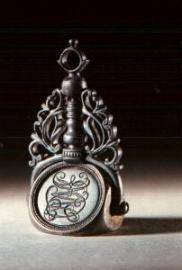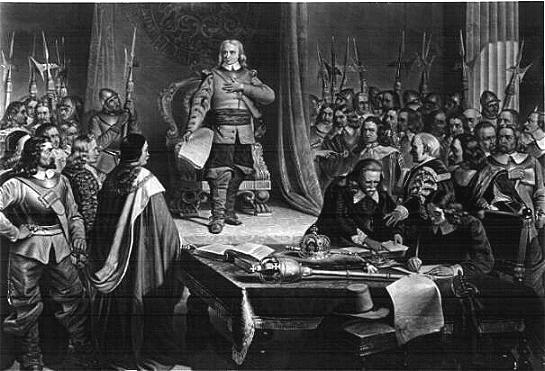


Cromwell's military standing gave him enhanced political
power, just as his military victories gave him the confidence and motivation to
intervene in and to shape political events. An obscure and inexperienced MP for
Cambridge in 1640, by the late 1640s he was one of the power-brokers in
parliament and he played a decisive role in the 'revolution' of winter 1648-9
which saw the trial and execution of the King and the abolition of monarchy and
the House of Lords. As head of the army, he intervened several times to support
or remove the republican regimes of the early 1650s.

Eventually, in December 1653, he became head of state
as Lord Protector, though he held that office under a written constitution which
ensured that he would share political power with parliaments and a council. As
Lord Protector for almost five years, until his death on 3 September 1658,
Cromwell was able to mould policies and to fulfil some of his goals. He headed a
tolerant, inclusive and largely civilian regime, which sought to restore order
and stability at home and thus to win over much of the traditional political and
social elite. Abroad, the army and navy were employed to promote England's
interests in an expansive and largely successful foreign policy. As
Protector Cromwell also retained a more radical edge, springing from his strong
religious faith. A conversion experience sometime before the civil war,
strengthened by his belief that during the war he and his troops had been chosen
by God to perform His will, gave a religious tinge to many of his political
policies in the 1650s. Cromwell sought 'Godly reformation', a broad programme
involving reform of the most inhumane elements of the legal, judicial and social
systems and clamped down on drunkenness, immorality and other sinful activities.
He also believed passionately in what he called 'liberty of conscience', that is
freedom for a range of Protestant groups and faiths to practise their beliefs
undisturbed and without disturbing others. Several times he referred to this
religious liberty as the principal achievement of the wars, to be strengthened
and cherished now that peace had returned. Others, however, viewed these
religious policies as futile, unnecessarily divisive or a breeding ground for
heresy.
Home Page | Where did he come from? | Cromwell the Soldier
Cromwell the Politician | The English Civil Wars | History's Verdict on Cromwell
Diary of Events | Places to Visit | Cromwell Association
Cromwell CD ROM | Cromwell Souvenirs | How to find out more - reading
How to find out more - Other Sources | On-line Exhibition | What Happened in 1899?
News Index